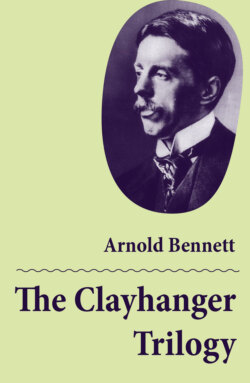Читать книгу The Clayhanger Trilogy (Consisting of Clayhanger + Hilda Lessways + These Twain) - Arnold Bennett - Страница 137
На сайте Литреса книга снята с продажи.
Chapter 10. The Centenary.
ОглавлениеTable of Contents
It was immediately after this that the “Centenary”—mispronounced in every manner conceivable—began to obsess the town. Superior and aloof persons, like the Orgreaves, had for weeks heard a good deal of vague talk about the Centenary from people whom intellectually they despised, and had condescended to the Centenary as an amiable and excusable affair which lacked interest for them. They were wrong. Edwin had gone further, and had sniffed at the Centenary, to everybody except his father. And Edwin was especially wrong. On the antepenultimate day of June he first uneasily suspected that he had committed a fault of appraisement. That was when his father brusquely announced that by request of the Mayor all places of business in the town would be closed in honour of the Centenary. It was the Centenary of the establishment of Sunday schools.
Edwin hated Sunday schools. Nay, he venomously resented them, though they had long ceased to incommode him. They were connected in his memory with atrocious tedium, pietistic insincerity, and humiliating contacts. At the bottom of his mind he still regarded them as a malicious device of parents for wilfully harassing and persecuting inoffensive, helpless children. And he had a particular grudge against them because he alone of his father’s offspring had been chosen for the nauseating infliction. Why should his sisters have been spared and he doomed? He became really impatient when Sunday schools were under discussion, and from mere irrational annoyance he would not admit that Sunday schools had any good qualities whatever. He knew nothing of their history, and wished to know nothing.
Nevertheless, when the day of the Centenary dawned—and dawned in splendour—he was compelled, even within himself, to treat Sunday schools with more consideration. And, in fact, for two or three days previously the gathering force of public opinion had been changing his attitude from stern hatred to a sort of half-hearted derision. Now, the derision was mysteriously transformed into an inimical respect. By what? By he knew not what. By something without a name in the air which the mind breathes. He felt it at six o’clock, ere he arose. Lying in bed he felt it. The day was to be a festival. The shop would not open, nor the printing office. The work of preparing for the removal would be suspended. The way of daily life would be quite changed. He was free—that was, nearly free. He said to himself that of course his excited father would expect him to witness the celebrations and to wear his best clothes, and that was a bore. But therein he was not quite honest. For he secretly wanted to witness the celebrations and to wear his best clothes. His curiosity was hungry. He admitted, what many had been asserting for weeks, that the Centenary was going to be a big thing; and his social instinct wished him to share in the pride of it.
“It’s a grand day!” exclaimed his father, cheerful and all glossy as he looked out upon Duck Square before breakfast, “It’ll be rare and hot!” And it was a grand day; one of the dazzling spectacular blue-and-gold days of early summer. And Maggie was in finery. And Edwin too! Useless for him to pretend that a big thing was not afoot—and his father in a white waistcoat! Breakfast was positively talkative, though the conversation was naught but a repeating and repeating of what the arrangements were, and of what everybody had decided to do. The three lingered over breakfast, because there was no reason to hurry. And then even Maggie left the sitting-room without a care, for though Clara was coming for dinner Mrs Nixon could be trusted. Mrs Nixon, if she had time, would snatch half an hour in the afternoon to see what remained to be seen of the show. Families must eat. And if Mrs Nixon was stopped by duty from assisting at this Centenary, she must hope to be more at liberty for the next.
